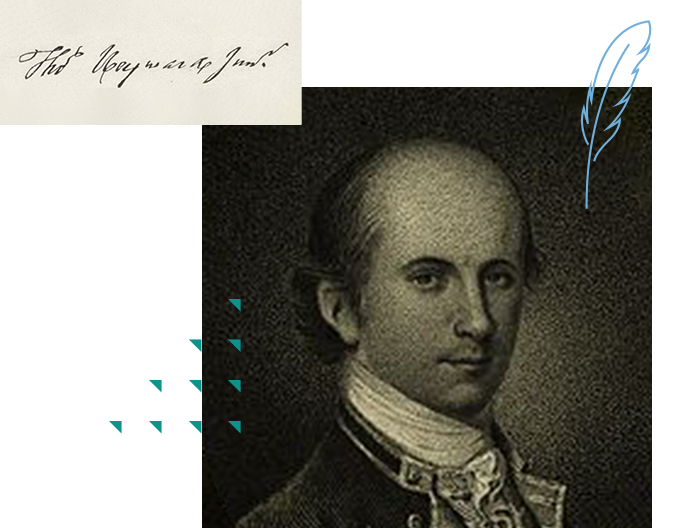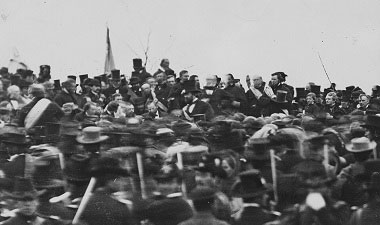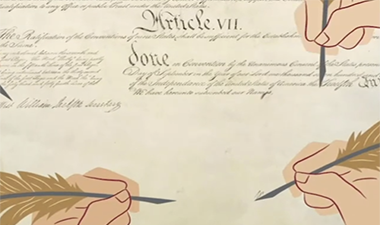Summary
Thomas Heyward voted for independence despite objections from his father, a wealthy plantation owner. He was held prisoner by the British for eleven months during the war.
Thomas Heyward, Jr. | Signer of the Declaration of Independence
2:21
Biography
Thomas Heyward Jr, [the Jr added to distinguish him from his uncle] was the son of a wealthy South Carolina family that had been in the colonies for five generations. His father, Daniel Heyward, had earned his fortune growing what Carolinians called “the golden seed from Madagascar”: rice. He owned thousands of acres of land to which Thomas was the heir and was one of the largest slaveholders in British North America.
Like many sons of the Southern planter elite, Thomas was tutored at home and then sent to England to study. He attended Cambridge University and then read law at the Middle Temple. He was called to the bar by the Inns of Court in London in the Spring of 1770. While studying in England, Thomas became acutely aware that colonists were looked down upon by English-born citizens and that English-born officeholders in the colonies showed little concern for Americans’ rights. He returned to South Carolina longing to be free of British rule.
But before heading home, Thomas toured Europe for several years. Here he observed what he considered the indolence and haughtiness of the luxury-loving people he encountered in his travels. This added to his dislike of Britain’s attitude toward Americans, made him eager to abandon all dependency on who he called the Old Country. He was one of the earliest South Carolinians to resist Britain’s new taxation policies beginning with the Stamp Act. After the battle of Lexington and Concord he openly opposed any reconciliation proposal that required absolute submission to the Mother Country’s will. When the royal governor of South Carolina abdicated, he proved eager to serve on the colony’s Committee of Safety.
Thomas’s father retained his loyalty to the Crown and frowned upon his son’s attendance at the Second Continental Congress. Despite his father’s disapproval, Thomas Heyward Jr voted for independence. He left Congress when his father died in October 1777 but returned in time to vote for the Articles of Confederation the following year.
During the early years of the war, Heyward served as a judge of Charleston’s criminal courts. In this role, he presided over the trials of several people charged with treason on behalf of the British army. The execution of these men made Heyward particularly obnoxious to the British government. When the enemy captured Charleston, he was seized as a prisoner of war and imprisoned as a leader of the rebellion. Along with fellow signer of the Declaration of Independence Edward Rutledge, he was taken to the British fort at St. Augustine and held prisoner for eleven months. The story has been told that during his time in prison Heyward wrote a parody of the British anthem God Save the King, calling it God Save the Thirteen States, and it became popular throughout the states.
Heyward’s wealth suffered severely during his years of imprisonment. The British army confiscated all his enslaved workers, transporting 130 of them to the sugar plantations of Jamaica. His properties were badly damaged. He almost lost his life as well, for on his release from prison he fell overboard from the ship carrying him home. He saved himself by clinging to the ship’s rudder until he could be rescued.
After the war Heyward returned to Charleston and served as a state judge. He was also a delegate to the state convention that adopted the South Carolina constitution in 1790. Much of his time and energies, however, were spent restoring his family’s plantations. Although he built a new plantation home he divided his time between it and his Charleston homes. When President George Washington came to Charleston he rented one of Heyward’s residences for his week-long visit.
Thomas Heyward Jr died in April of 1809 at the age of 63. He was remembered by Dr. Benjamin Rush of Pennsylvania as “a firm Republican of good education and amiable manners. He possessed an elegant political genius…”








